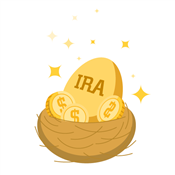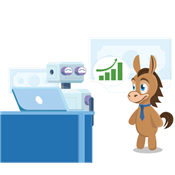Opening a Roth IRA is one of the best money moves you can make. But where should you open an account? Here are our top recommended Roth IRA providers.
 |
| © CreditDonkey |
- Ally Invest (for active traders)
- TD Ameritrade (for buy-and-hold investors)
- Betterment (for hands-off investors)
- Vanguard (for mutual fund investing)
- Acorns (best for college students & young adults)
- Empower (for complete wealth management)
- LendingClub (for alternative non-stock investing)
- Are you an investor who trades often? Are your commission fees taking a toll on your profits? Ally Invest offers low commission fees and no IRA fees.
- Do you want to invest, but you're not sure where to start? Investing with your own money can be stressful. That's why TD Ameritrade offers a virtual platform that allows you to practice before using real money.
- Do you prefer to be hands-off? Betterment is a robo-advisor that will automatically choose investments for you based on your goals and risk tolerance.
What is a Roth IRA?
 |
| © CreditDonkey |
A Roth IRA is an Individual Retirement Account. It's used for retirement savings and can only be withdrawn after you've reached a certain age.
With a Roth IRA, you are contributing money that has already been taxed in your paycheck. So you will not be taxed again when you take the funds out. All investment gains are tax-free too.
Of course, there are certain rules that must be followed. Here are some facts about Roth IRAs:
- Contributions are made with after-tax income.
- Your withdrawals are tax-free after age 59½.[1]
- The maximum contribution per year is $6,500 ($7,500 if you're 50 or over)[2]
- You can't contribute if you earn too much. The income limit is $138,000 for single filers and $218,000 for married couples filing jointly.[3]
- As long as you're earning income, you can contribute no matter your age
If you have a 401k through your employer, but you don't understand or know how to manage it, check out Blooom. Blooom is a dedicated 401k robo-advisor that will analyze your existing 401k and help you manage it.
Read on for our top Roth IRA providers for every kind of investor.
Ally Invest (Best for Active Traders)
If you're an active trader, you'll want a broker with lower commission fees.
Pros:
- Low fees: $0 commission on stock trades and ETF trades
- Impressive array of research and trading tools
- No account minimum for self-directed account
- Live customer service
Cons:
- $25 termination fee for the IRA account[4]
- $50 transfer fee anytime you transfer funds
Best for:
New investors may find the amount of information on Ally intimidating. Ally Invest is best for active investors who want a more hands-on approach in managing their Roth account.
Read our full review.
TD Ameritrade (Best for Buy-and-Hold Investors)
TD Ameritrade is one of the oldest names in brokerages. Its fees are higher than others, but it offers one of the most advanced platforms for the experienced investor.
Pros:
- Top-notch Thinkorswim platform available to every user
- Advanced tools and superior research offerings
- Hundreds of mutual funds with no transaction fee; 100+ commission-free ETFs.
- No account minimum deposit for retirement accounts
- Virtual practice platform before committing with real money
- Over 175 physical branches nationwide
- 24/7 customer support
Best for:
Not so active traders and experienced investors who will appreciate all the features, tools, and research options. If newbies find it too overwhelming, it also offers a more beginner-friendly Trade Architect platform.
Open an IRA in 15 minutes or less.
Here is how TD Ameritrade compares against Ally Invest, our top pick for active investors.
TD Ameritrade | Ally Invest | |
|---|---|---|
Commission-Free Trading - Online Stock, ETF and Option Trades - | Commission-Free Stock Trades - | |
Benefits and Features | ||
| Stock Trading | $0 commission for online stock, ETF, and option trades | |
| Options Trading | ||
| Minimum Deposit | ||
| Mutual Fund Trading | Up to $49.95 or $74.95 for buys. $0 for sells |
|
TD Ameritrade: Pricing information from published website as of 09/05/2023. Ally Invest: Pricing information from published website as of 04/01/2021. | ||
- $0 stock trades
- 6,500+ mutual funds with no transaction fee; 100+ ETFs with no transaction fee
- No account minimum deposit for retirement accounts
E*TRADE has better trading tools and a wider variety of investments. It has a huge selection of no-fee mutual funds and ETFs.
We picked E*TRADE as our favorite overall brokerage firm. It's a solid choice for any investment style. It also has more than two dozen branches scattered across the country. However, we think that TD Ameritrade's larger nationwide presence make it a smarter pick for opening a Roth IRA.
TD Ameritrade | E*TRADE | |
|---|---|---|
Benefits and Features | ||
| Stock Trading | $0 commission for online stock, ETF, and option trades | |
| Options Trading |
| |
| Minimum Deposit | $0 for self-directed brokerage accounts; Managed portfolios start at $500 minimum | |
| Mutual Fund Trading | Up to $49.95 or $74.95 for buys. $0 for sells | $0 for no-load, no-transaction-fee funds; $19.99 for transaction-fee funds |
| Commission Free ETFs | ||
| Live Chat Support | ||
| Penny Stocks | ||
| Broker Assisted Trades | ||
| Inactivity Fee | ||
| Maintenance Fee | ||
| Online Platform | ||
| Banking | Cash Management account offers free ATM withdrawals, no monthly maintenance fees, free online bill pay, and free check writing. | Checking account offers no minimum balance requirements, free online bill pay, and unlimited debit card and check transactions. |
| Mobile App | ||
| Desktop App | E*TRADE Pro (requires you to execute at least 30 trades during a calendar quarter or maintain brokerage account balance of at least $250,000) | |
| Forex Trading | ||
| Futures Trading | $2.25 per contract (plus exchange & regulatory fees) | $1.50 per contract, per side + fees (excluding bitcoin futures) |
| Bond Trading | ||
| CFD Trading | ||
| Currency Trading | ||
| Customer Service | ||
| Locations | More than 100 locations in 34 states | |
| Seminars | ||
| Trading Platform | ||
| Virtual Trading | ||
| Stock Trading | ||
| Options Trading | ||
| Banking | ||
| Mobile App | ||
| Commissions and Fees | ||
| Ease of Use | ||
| Online Community | ||
| Research | ||
| Trading Platform | ||
Blank fields may indicate the information is not available, not applicable, or not known to CreditDonkey. Please visit the product website for details. TD Ameritrade: Pricing information from published website as of 09/05/2023. E*TRADE: Pricing information from published website as of 01/04/2024. | ||
Betterment (Best for Hands-Off Investors)
Betterment
Pros:
| Cons:
|
Our Review: ![]()
![]()
![]()
![]()
![]()
Maybe you don't understand anything about trading and you're afraid to mess up. Or maybe you just don't have the time to invest yourself.
That's where robo-advisors can help. In the past, you'd have to hire a real-life financial advisor to do it for you. But they're expensive. Robo-advisors use automated algorithms, so the fees are low.
Betterment is one of the most popular robo-advisors. All you have to do is set up your timeline, your goals, and how much risk you're willing to take. Betterment will then come up with an investment strategy for you.
Pros:
- Low 4/month
or 0.25% annual advisory fee
[5]
- It does all the work for you
- No minimum balance required
- Automatically rebalances your portfolio
- Retirement planner gives you personalized advice
Cons:
- Must trust computer to make the best choices for you
- Only invests in ETFs
- The 0.65% annual fee for accounts $100,000+ is steep
Best for:
Nervous beginners or anyone who wishes to take a hands-off approach.
Betterment: Compare Pricing
Generally speaking, a Roth IRA would grow faster. But with Roth IRAs, you'll have to deal with the contribution limits, eligibility requirements and withdrawal restrictions. With a cash value life insurance, it doesn't matter what your income is, and you can take a loan against your money without waiting until you are 59 1/2.
Runner up: Wealthfront
Wealthfront
Pros:
| Cons:
|
Our Review: ![]()
![]()
![]()
![]()
![]()
Wealthfront is another popular robo-advisor. It has a $500 minimum deposit and a low flat service fee of 0.25% no matter what your balance is.[6] Wealthfront even manages the first $10,000 for free. This may entice new investors.
However, Betterment has a slight edge for us. It has a goal setting feature, which Wealthfront lacks. This allows you to set multiple goals (such as retirement, a house, etc.) and create multiple funds that work towards the goals.
Vanguard (Best for Mutual Fund Investing)
Vanguard is the biggest name in mutual funds in the world. Vanguard is great for retirement investments, because it offers many no-commission mutual funds and ETFs. So you keep more dollars for your retirement.
Pros:
- Over 260 Vanguard Mutual Funds and over 80 Vanguard ETFs
- Over 3,000 no-transaction-fee mutual funds
- Over 1,800 commission-free ETFs
- Waive $20 annual account fee by signing up for e-delivery
Cons:
- Trade fees are higher than other brokerages (and increase for active traders)
- Not very sophisticated platform
- Not good for buying individual stocks
- Minimum initial investment of least $1,000 or $3,000[7]
Best for:
Buy-and-hold mutual fund and ETF investors. Or very high networth investors who can take advantage of the low trade fees when they reach a certain balance threshold.
Acorns (Best for College Students and Young Adults)
It's never too early to start planning for retirement. Young adults may like the millennial-friendly micro-investing app Acorns.
Acorns started as an "invest spare change" robo-advisor. You simply link up credit cards and round-ups from your purchases are automatically invested. This makes investing mindless and simple.
Now, it also offers Acorns Later IRA accounts. You can't invest your spare change into the IRA account, but it still makes for a solid option. You can receive a 1% or 3% IRA match on your new contributions to your Acorns Later account, depending on your subscription tier.
Pros:
- Fee only starts at $3/month[8]
- Robo-advisor does all the investing for you
- Automatic management, including portfolio rebalancing
- Start investing with just $5
- Set recurring contributions or make one-time contributions
Cons:
- You don't get to choose your risk level; it's chosen for you based on your age.
Best for:
Acorns is great for young adults because it helps you save. The Core investing account and IRA account are a good combination for newbies to get into investing.
But the $3/month fee ($36 per year) may be expensive for beginners with just a little bit of money invested. For balances less than $14,400, Acorns will cost more than Betterment's 0.25% annual fee.
Empower (Best for Complete Wealth Management)
If you have at least $100,000 to invest, consider Empower investment advisory service.
Empower is a hybrid robo-investor combined with real human management. It uses your overall financial situation to create the best plan for you.
Pros:
- Free advanced money management tools
- See your entire financial picture in one place
- Free financial consultation
- Custom investment strategy based on your goals
- Financial advisors will make adjustments if your situation changes
- Full financial and retirement plan (for balances over $200k)
Cons:
- $100,000 minimum investment
- Annual fee starting at 0.89% may be high if you know how to manage your own portfolio[9]
Best for:
High net-worth investors who wants to be hands-off. The annual fee is higher than that of other robo-advisors, but you do receive a more personalized plan.
- The Investment Checkup tool analyzes your current investment strategy, and lets you know if you should change your allocation.
- The Retirement Planner calculates if you're on-track to your retirement goals and what you need to do to get there.
- The Fee Analyzer tells you just how much fees you're paying for funds, and suggests alternative allocations.
Difference Between a Roth IRA and 401k
In short - a 401k is an employer-sponsored retirement plan. You sign up for it through your work. A Roth IRA is an individual retirement plan - meaning you open the account yourself.
Here are some key features of both so you can understand the difference.
401k:
- Offered through your employer
- Contributions are made with your pre-tax dollars
- Contributions are tax deductible
- Max contribution of $22,500 ($30,000 if you're 50 or over)[10]
- Your employer may offer a match up to a certain %
- You will pay income tax when you withdraw
- Early withdrawals have 10% penalty
- Investments are selected by your employer
Roth IRA:
- You open the account yourself
- Contributions are made with your after-tax dollars
- Contributions are NOT tax deductible
- Max contribution of $6,500 ($7,500 if you're 50 or over)[11]
- There is no contribution match
- You will not be taxed when you withdraw funds upon retirement
- Can withdraw contributions at any time penalty-free; withdrawing earnings early has 10% penalty
- You select your own investments (unless you sign up with a robo-advisor)
Is better to invest in Roth IRA or 401k? It's smart to have both a 401k and a Roth IRA. A Roth IRA works great as supplemental retirement income. However, if you only have the means to pay into one, we advise that you max out your 401k contributions - at the very least to what your employer matches.
Common Questions
 |
What's the difference between a Traditional IRA and Roth IRA?
The main difference is that Roth IRA contributions are made with post-tax money. So when you withdraw at retirement, you won't pay taxes.
With a Traditional IRA, the contributions are pre-tax. You'll avoid paying tax now, but when you withdraw later, you will have to pay normal income tax.
Is a Roth IRA account good to have?
Yes. The main advantage of a Roth IRA is the tax benefits. In addition to that, a Roth IRA also gives you flexibility in how you want to invest.
In fact, depending on your account provider, you can invest in almost anything you want, including money market accounts, stocks, bonds, mutual funds, or exchange-traded funds (ETFs). And any gains from those investments are not taxed.
How much can I contribute to a Roth IRA?
The government has limits for how much you can contribute. These figures change, so check with the IRS each year.
For 2023, the maximum amount you can invest in a Roth is $6,500. If you're 50 or over, you can contribute or $7,500 (called a catch-up contribution).
However, there are some stipulations for Roth IRA contributions in 2023:
If your filing status is single:
| Modified Adjusted Gross Income: | You can contribute: |
|---|---|
| Less than $138,000 | up to the full limit |
| $138,000-$153,000 | a limited contribution |
| $153,000 or more | cannot contribute |
If your filing status is married filing jointly:
| Total Modified Adjusted Gross Income: | You can contribute: |
|---|---|
| Less than $218,000 | up to the full limit |
| $218,000-$228,000 | a limited contribution |
| $228,000 or more | cannot contribute |
You have 15 months to make a contribution for the current tax year. So for 2023, you have until April 15, 2024 to make your contributions.
When can I withdraw from a Roth IRA?
There are strict rules for withdrawal too. First, you cannot touch the funds for at least five years. And then you need to wait until you're 59½ to withdraw tax- and penalty-free. Anything earlier will cost you in taxes and a 10% penalty.
But this only applies to your earnings. You're allowed to withdraw from your contributions without penalty. This flexibility is nice if you suddenly need some extra cash.
If you're near retirement, you may want to consider investing in a money market account through your Roth IRA. Money market accounts typically don't offer as much growth potential as stocks and bonds, but they're more stable.
Where to open a Roth IRA?
Everything sounds pretty simple so far, right? Well, here's where it gets complicated:
There are many places to open Roth IRA accounts. Some of the most common include:
- your bank
- online brokers (like TD Ameritrade or E-*TRADE)
- mutual fund companies (like Fidelity or Vanguard)
| For | Roth IRA Provider |
|---|---|
| Active Traders | Ally Invest |
| Buy-and-Hold Investors | TD Ameritrade |
| Robo-Advisor | Betterment |
Can I lose money in an IRA account?
Yes, there is risk of losing money with any investment. If the stocks of a company you've invested with is not doing well, then you will lose money. If you're closer to retirement age or you don't like risk, then investing in bonds will provide more stability.
What's a good investment for a beginner?
Instead of purchasing individual stocks, take a look at investing in exchange-traded funds (ETFs). ETFs generally track an index, such as the S&P 500, and allow you to invest in a bundle of assets at a low cost. Many brokerages offer commission-free ETFs.
But pay attention to expense ratios. Mutual funds and ETFs charge an expense ratio to cover their costs. The seemingly small fee can add up to a big amount over the lifetime of your retirement account.
Where can I find the best Roth IRA rates?
Unfortunately, there is no answer to this question. Your return will depend on what kind of investments you make.
However, if you're more comfortable with a fixed rate, you can check out IRA accounts offered by banks. For example, Ally Bank offers an IRA savings account with a competitive rate.
How many Roth IRA accounts can I have?
Legally, there is no limit to the number of Roth IRA accounts you can have. However, your total contributions cannot exceed the maximum limit.
Having a couple of Roth IRA accounts could be a good idea to diversify your investments. For example, you can have an Ally Invest account invested in stocks and bonds.
Can teens have a Roth IRA?
Yes. If the teen has a part-time job and is earning income, then he/she can contribute to a Roth IRA.
If the teen is a minor, the parent would have to open a custodial IRA using the teen's Social Security number. The parent can fund it from his own bank account, but only up to the teen's earned income (up to the contribution limit). Once the teen reaches 18 or 21 (depending on your state), the account can be registered in his/her name.
Not all brokerages offer custodial accounts. Look at Vanguard, TD Ameritrade, and Charles Schwab if you want to set up a Roth IRA for your teen.
Bottom Line
Opening a Roth IRA is one of the best money moves you can make.
References
- ^ Internal Revenue Service. IRA FAQs - Distributions (Withdrawals), Retrieved 4/9/2023
- ^ Internal Revenue Service. Retirement Topics - IRA Contribution Limits, Retrieved 4/9/2023
- ^ Internal Revenue Service. Amount of Roth IRA Contributions That You Can Make For 2023, Retrieved 4/9/2023
- ^ Ally Invest Commissions and Fees, Retrieved 4/9/2023
- ^ Betterment. Pricing, Retrieved 12/03/2023
- ^ Wealthfront. Pricing, Retrieved 4/9/2023
- ^ Vanguard. Vanguard Mutual Fund Fees & Minimums, Retrieved 4/9/2023
- ^ Acorns. Pricing, Retrieved 07/01/2024
- ^ Empower. Wealth Management: Our fee structure, Retrieved 4/9/2023
- ^ Internal Revenue Service. Retirement Topics - 401(k) and Profit-Sharing Plan Contribution Limits, Retrieved 4/8/23
- ^ Internal Revenue Service. Retirement Topics - IRA Contribution Limits, Retrieved 4/8/23
Ross Frasier is a research analyst at CreditDonkey, a personal finance comparison and reviews website. Write to Ross Frasier at ross@creditdonkey.com. Follow us on Twitter and Facebook for our latest posts.
Note: This website is made possible through financial relationships with some of the products and services mentioned on this site. We may receive compensation if you shop through links in our content. You do not have to use our links, but you help support CreditDonkey if you do.
Empower Personal Wealth, LLC (“EPW”) compensates CREDITDONKEY INC for new leads. CREDITDONKEY INC is not an investment client of Personal Capital Advisors Corporation or Empower Advisory Group, LLC.
|
|
|










